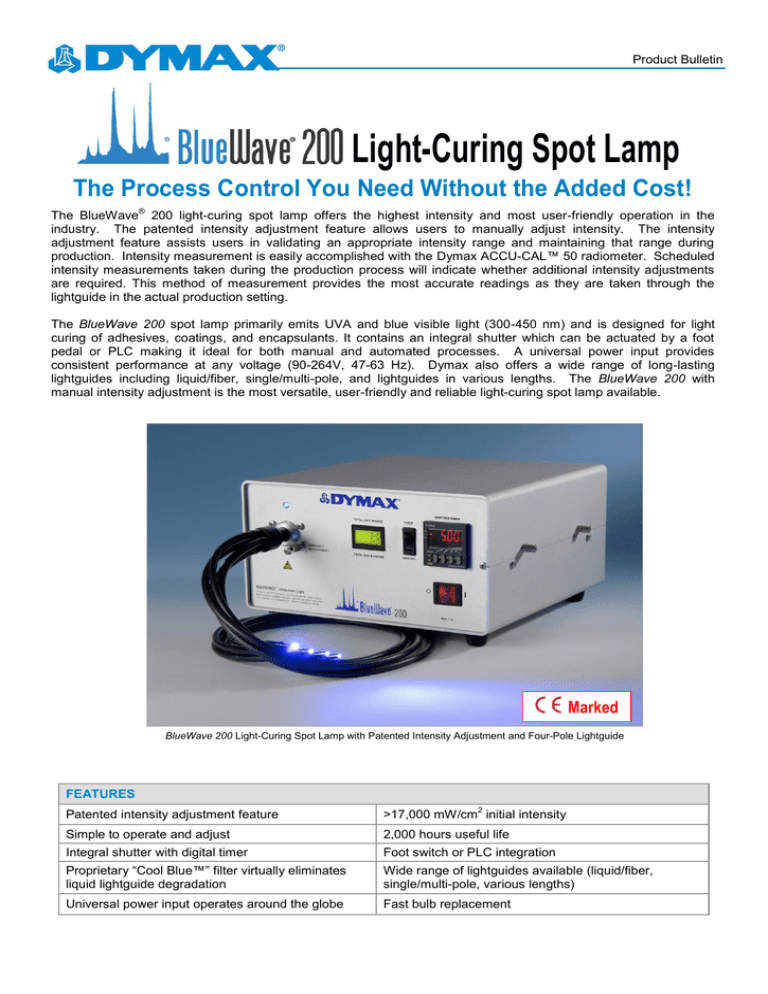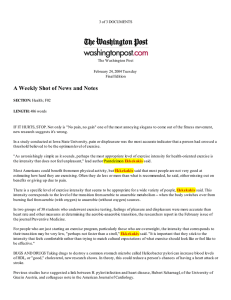
Product Bulletin
Light-Curing Spot Lamp
The Process Control You Need Without the Added Cost!
®
The BlueWave 200 light-curing spot lamp offers the highest intensity and most user-friendly operation in the
industry. The patented intensity adjustment feature allows users to manually adjust intensity. The intensity
adjustment feature assists users in validating an appropriate intensity range and maintaining that range during
production. Intensity measurement is easily accomplished with the Dymax ACCU-CAL™ 50 radiometer. Scheduled
intensity measurements taken during the production process will indicate whether additional intensity adjustments
are required. This method of measurement provides the most accurate readings as they are taken through the
lightguide in the actual production setting.
The BlueWave 200 spot lamp primarily emits UVA and blue visible light (300-450 nm) and is designed for light
curing of adhesives, coatings, and encapsulants. It contains an integral shutter which can be actuated by a foot
pedal or PLC making it ideal for both manual and automated processes. A universal power input provides
consistent performance at any voltage (90-264V, 47-63 Hz). Dymax also offers a wide range of long-lasting
lightguides including liquid/fiber, single/multi-pole, and lightguides in various lengths. The BlueWave 200 with
manual intensity adjustment is the most versatile, user-friendly and reliable light-curing spot lamp available.
Marked
BlueWave 200 Light-Curing Spot Lamp with Patented Intensity Adjustment and Four-Pole Lightguide
FEATURES
2
Patented intensity adjustment feature
>17,000 mW/cm initial intensity
Simple to operate and adjust
2,000 hours useful life
Integral shutter with digital timer
Foot switch or PLC integration
Proprietary “Cool Blue™” filter virtually eliminates
liquid lightguide degradation
Wide range of lightguides available (liquid/fiber,
single/multi-pole, various lengths)
Universal power input operates around the globe
Fast bulb replacement
How Does the BlueWave® 200's Patented Intensity Adjustment Feature Work?
All bulbs used to power high intensity light-curing spot lamps degrade over time from normal use. This typically
results in a gradual decrease in total intensity as the bulb ages (shown in Chart 1). Recognizing this, UV light-curing
processes are usually validated using the lowest acceptable intensity level to maximize bulb life. However, this
means that for the majority of the production process, curing is being done with a higher intensity level than is
®
actually necessary, and it can be expected that the intensity will be decreasing over time. With the BlueWave
200’s patented intensity adjustment feature, users can maintain the qualified intensity range by manually increasing
intensity output to offset this degradation. The adjustment is easily accomplished with the provided adjusting tool or
by using the removable knob as shown in the photographs below. This feature is useful for both process validation
and subsequent process control during production.
Chart 1.
BlueWave 200 New Intensity Control Feature
Intensity
Typical bulb degradation curve
for the BlueWave 200
New Intensity Control Feature
Users are now able to maintain a constant Intensity by manually
controlling how much light is transmitted through the lightguide.
0
200
400
600
800
1000
1200
1400
1600
1800
2000
Bulb Life (Hours)
Validation
Prior to production, Dymax advises customers to conduct testing to determine the exposure time and intensity
required to achieve full cure. Validating a UV light-curing process can be accomplished in one of two ways:
Set Exposure Time, Determine Intensity
Users can specify a cure time and through empirical testing, determine the intensity required to achieve full cure.
Set Intensity, Determine Exposure Time
Users can specify intensity (perhaps one that maximizes bulb life)
through empirical testing to determine the exposure time required to
achieve full cure.
Intensity Adjustment Options
Note: As with any manufacturing process, it is advisable to incorporate a
safety factor.
Control
UV process validation indentifies a minimum acceptable
intensity range that ensures complete cure in an acceptable
cycle time. Users can choose to operate at full intensity
(intensity adjusted to 100%) or maintain a constant intensity (at
some lower level) through periodic manual adjustments. The
average BlueWave 200 bulb will typically degrade <1% per
eight hours of normal use. The good manufacturing practice of
routine intensity measurement with a calibrated radiometer will
determine when and if any adjustments are required.
Page 2
Intensity adjustment knob
for fingertip adjustment
Intensity adjustment, with
knob removed, performed
with adjustment tool
SPECIFICATIONS
Initial Intensities
Total (280-450 nm)
Visible (400-450 nm)
1
UVA (320-395 nm)
UVB (280-320 nm)
2
40+ W/cm
2
17+ W/cm
2
17+ W/cm
2
7 W/cm
Intensity Adjustment
Power Requirements
Power Supply
Bulb
Reflector
Shutter Timer
Shutter Activation
I/O Port
Manual from 1% to 100% output
90-264V, 47-63 Hz
Solid-state, 200 Watt
200 Watt mercury bulb included; replacement in less than one minute
Elliptical; glass with dichroic coating to reflect UV and minimize IR
Digital LCD timer up to 99.99 seconds; manual or timed shutter
Foot switch or PLC
9 pin D – sub-miniature connector
Inputs:
Shutter activate, shutter deactivate
Signals (PLC Integration)
Outputs:
Cooling
Hour Meter
Overall Dimensions
Weight
System Warranty
Bulb Warranty
Replacement Bulb
PART NUMBERS
Lamp on, lamp off, replace lamp
Shutter opened, shutter closed, shutter fault
Filtered, dual-fan arrangement; thermally controlled to maintain proper
lamp temperature
Digital LCD; total unit operating hours (non re-settable) and total bulb
hours (re-settable)
30.5 cm x 30.5 cm x 16.5 cm (12” x 12” x 6.5”)
5.4 kg (12 lbs.)
One year from purchase
Ignition warranted for 2,000 hours
38465
38605 Asian Version (Type G Plug)
38903 Unit With No Power Cord
1
As measured with a Dymax ACCU-CAL™ 50 Radiometer (320-395 nm). Excessive on/off cycles and improper cooling may affect bulb
degradation and therefore no warranty is expressed or implied.
Table 1 – Recommended Lightguides (sold separately)
Part
Number
Lightguide Description
(all noted are liquid filled,
quartz fiber are also available)
Minimum
Initial
1
Intensity
2
(W/cm )
Typical
Intensity at
1
2,000 Hours
2
(W/cm )
5720
Single pole
5 mm x 1 Meter
17.0
8.0
5721
Single pole
5 mm x 1.5 Meters
16.0
7.5
5722
Single pole
8 mm x 1 Meter
13.0
6.5
38476
Two pole
3 mm x 1 Meter
10.5
5.2
38477
Three pole
3 mm x 1 Meter
9.0
4.5
38478
Four pole
3 mm x 1 Meter
7.4
3.7
Trifurcated wand curing
metal-to-plastic assembly
1
As measured with a Dymax ACCU-CAL™ 50 Radiometer (320-395 nm). Excessive on/off cycles
and improper cooling may affect bulb degradation and therefore no warranty is expressed or implied.
Page 3
Lightguide Mounting Stand
(fits 3 mm, 5 mm and 8 mm lightguides)
PN 39700
ACCU-CAL™ 50 Radiometer
for measuring the UV intensity of
spot lamps, flood lamps and
conveyor systems PN 39560
UV-Blocking, Over-the-Glasses
Eye Protection
Clear PN 35284 Tinted PN 35285
Dark Tint PN 35286
Liquid-Lightguides
available in 1, 2, 3 & 4-pole configurations (see
Table 1. on Page 2 for sizes and part numbers)
Angled Terminators for Lightguides
3 mm/60 PN 39029 3 mm/90 PN 39030
5 mm/60 PN 38042 5 mm/90 PN 38049
Rod Lenses
Shown: BlueWave 200 with 8 mm rod lens
(rod lenses require an 8 mm lightguide)
2” x 2” Area (100 mW/cm2) PN 38699
5” x 5” Area (30 mW/cm2) PN 38698
© 2006-2012 Dymax Corporation. All rights reserved. All trademarks in this guide, except where noted, are the property of, or used under license by Dymax Corporation, U.S.A.
Please note that most dispensing and curing system applications are unique. Dymax does not warrant the fitness of the product for the intended application. Any warranty applicable to the product, its application and use is strictly limited to that contained in
Dymax’s standard Conditions of Sale. Dymax recommends that any intended application be evaluated and tested by the user to insure that desired performance criteria are satisfied. Dymax is willing to assist users in their performance testing and evaluation by
offering equipment trial rental and leasing programs to assist in such testing and evaluation. Data sheets are available for valve controllers or pressure pots upon request.
LIT218DA 10/24/2012
Dymax Corporation
860.482.1010
info@dymax.com
www.dymax.com
Dymax Oligomers &Coatings
860.626.7006
oligomers&coatings@dymax.com
www.dymax-oc.com
Dymax Europe GmbH
+49 (0) 611.962.7900
info_de@dymax.com
www.dymax.de
Dymax UV Adhesives &
Equipment (Shenzhen) Co Ltd
+86.755.83485759
dymaxasia@dymax.com
www.dymax.com.cn
Dymax UV Adhesives &
Equipment (Shanghai) Co Ltd
+86.21.37285759
dymaxasia@dymax.com
www.dymax.com.cn
Dymax Asia (H.K.)
Limited
+852.2460.7038
dymaxasia@dymax.com
www.dymax.com.cn
Dymax Korea LLC
82.2.784.3434
info@dymax.kr
www.dymax.co.kr


